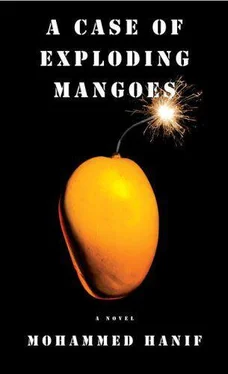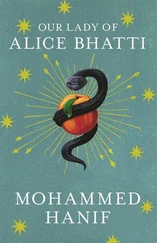Secretary General’s whispers are echoing in the cell. I can’t decide if he is in a delirium or trying to entertain me. “Comrade, I think I’ve gone blind. I can’t see anything.” I rub my own eyes and don’t see anything. But I know I am not blind. “I swear I can’t see anything. They brought food, they opened the door but I didn’t see anything. Not a thing.”
“It’s probably night-time, comrade,” I say, trying to suppress a yawn. Remember day and night? Night, day, then again night.
After the Inter Services Intelligence’s counter-espionage unit carried out its weekly sweep through the living quarters of the Army House for any bugs or jamming devices, Brigadier TM started an old — fashioned, hands-on inspection of the premises. He removed the hand-woven burgundy silk covers from the sofa cushions and ran his fingers along their velvet lining. He gave the matching drapes a good shake, combed his way through the brown silk tassels and looked suspiciously at the silver curtain holdbacks. The Persian rugs, plundered from the palaces of Afghan kings and presented to General Zia by Afghan mujahideen commanders, were removed one by one and TM’s boots searched for any uneven surfaces on the grey synthetic underlay. The table lamps, shiny brass with silk cord switches, were turned on and off and on again. Brigadier TM’s mistrust of the ISI was based on a simple principle: the cops and thieves should be organised separately. His problem with the ISI was that everything was being done by the same people. After sweeping through the living quarters with their bug detectors and scanners and patting the seats of some random chairs they had simply signed a document saying no espionage devices were detected. Brigadier TM never knew whether to trust these signed documents. After all, potential presidential assassins don’t go about their business signing affidavits as they close in on their target. Brigadier TM had done his staff and command course, and he understood why a country needed an intelligence service, why an armed service needed spies to spy on its own men and officers, and he could live with that. But there was another reason he didn’t like these military intelligence types. Brigadier TM didn’t like them because they didn’t wear uniforms. It was hard enough to trust anyone who didn’t wear a uniform, but how on earth could you trust someone with a rank , who didn’t wear a uniform? Brigadier TM considered ISI a menace on a par with the corrupt Pakistani police and lazy Saudi princes, but since his job was to watch and keep quiet, he never mentioned it in front of General Zia. Going through the trophy cabinet, he concluded that the sheer amount of stuff in the Army House was a security hazard. “Who needs all these photos?” He stood in front of a wall covered with framed portraits of former generals who had ruled the country. Brigadier TM couldn’t help noticing that they had progressively got fatter and that the medals on their chests had multiplied. He came to the end of the row of photographs and stood in front of a large portrait. In this oil painting, Muhammad Ali Jinnah, the Founder of Pakistan, was wearing a crisp Savile Row suit and was absorbed in studying a document. With a monocle in his left eye and his intense gaze, Jinnah looked like a tortured eighteenth-century chemist on the verge of a new discovery.
Brigadier TM looked at the Founder’s portrait with admiration; he didn’t mind civilians if they were properly dressed and behaved like civilians. “Look at this guy.” He took a step towards the portrait. “He was a civilian and he wore civilian clothes and he said civilian things, but at heart he was a soldier.” TM didn’t mind saluting this guy, out of sheer patriotism, the kind of patriotism that only a decorated soldier can feel; he took a step backwards and saluted. As his foot landed on the carpet, his hand made an arc in the air and his open palm reached his eyebrow, the frame tilted. It tilted ever so slightly, but Brigadier TM’s alert eyes noticed the tilt and he suddenly looked around. He felt embarrassed and shy, like a child who has disturbed an immaculate ikebana arrangement at a rich cousin’s house. Brigadier TM moved forward, held the frame by its corners with both his hands, took a step back to see if it was level and then with a shudder let the frame go. His right hand reached for his holster and stopped. The Founder had winked at him from behind his monocle. He could swear he had seen his left eye move.
“I have done that myself sometimes.”
When TM heard General Zia’s voice, he turned round and saluted, this time less aggressively, shifting his feet slightly to cover the frame so that Zia couldn’t see the tilt in it.
Without his uniform and presidential paraphernalia, General Zia seemed to have shrunk. His silk gown floated about him. His moustache, always waxed and twirled, drooped over his upper lip.
He was sucking it nervously. His hair, always oiled and parted down the middle, was in a state of disarray, like a parade squad on tea break.
“He was the only true leader we have ever had,” General Zia said and stopped as if expecting Brigadier TM to correct him.
Brigadier TM was still in shock. He didn’t believe in superstitions. He didn’t believe in coincidences. He knew that if your gun was oiled and safety catch unlocked, it would shoot. He knew if your wind-speed calculations were accurate and you knew how to control your descent, your parachute would land you where you wanted to land. He knew if you mentioned a prisoner’s daughter’s name after keeping him awake for three days, he would talk. Brigadier TM had no experience of monocle-wearing dead men in gilt-edged frames blinking back to his salutes.
“This portrait is not security-cleared, sir. General Akhtar should not have violated Code Red.”
“Dear son, I can live with the rumours in the American rags but do I have to be scared of pictures gifted to me by my own intelligence chief? Is General Akhtar under suspicion now? Are you saying I am not safe even in my own drawing room?” General Zia paused for a moment, then added, “Or do you not like the man in the picture?”
“He was a civilian, sir, but he got us this country.”
General Zia thrust his hands in the pockets of his gown to hide his irritation; Brigadier TM had no sense of history. “Well, if you compare him to that banya Gandhi, or that fornicator Nehru, yes, of course he was a great leader. But since then there have been others who in their own humble way…” General Zia looked at TM’s blank face, realised that he wasn’t going to get any compliments from him and decided to change the subject.
“Son, I feel like a prisoner in this house. These ISI people are stupid. They know how to fight the Russians, by jingo they’ve got their spies spread across half the world, but they can’t figure out who is trying to assassinate their own President.”
One thing that Brigadier TM never did was snitch on his brothers in uniform, even if they chose not to wear their uniforms. He also tried to change the topic, came up with a proposal and immediately regretted it.
“Why don’t you go for an Umra, sir?”
General Zia went to Mecca at least ten times a year and Brigadier TM had to accompany him. He knew General Zia felt very safe there, but he also knew that General Zia behaved like a twelve-year-old having a bad birthday. He threw tantrums, he cried, he smashed his head against the black marble wall of the Khana Kaaba, he sprinted around it as if he was in some kind of competitive run, not on a pilgrimage.
“Do you think Jinnah would go on a pilgrimage under these circumstances?”
Brigadier TM felt the Founder’s eye blink at the back of his head. He wanted to point out that Jinnah had never gone on a pilgrimage to Mecca. He wanted to say that even if he had found the time to get away for some spiritual replenishment, the Founder would have probably headed for a pub in west London. TM stood at attention, ignoring Zia’s question. He wriggled his toes in his boots; he wasn’t sure if his head was getting the blood circulation it needed.
Читать дальше












